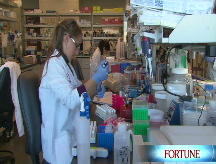Recharging a high-tech battery industry
The country is behind when it comes to advanced vehicle batteries, but innovation and a little stimulus money could head off another OPEC scenario.
 |
| An array of 88 lithium ion batteries sits in the rear of this Johnson Controls i3 plug-in hybrid. |
NEW YORK (CNNMoney.com) -- There's a saying as the nation pushes for cleaner electric cars: The United States will end up trading dependence on Saudi oil for dependence on Asian batteries.
Most of the big players in advanced batteries - the ones used to power the cars of tomorrow - are from Japan, South Korea or China.
America's battery industry is in need of a shock. Enter Stimulus.
As part of the nearly $900 billion economic lifeline, lawmakers plan on spending $2 billion in loan guarantees and grants for makers of advanced batteries. They don't necessarily have to be U.S. companies that get the money, but they need to set up shop on American soil.
Industry observers have high hopes for the plan, but worry that the money won't be doled out fast enough or that it will be eaten up by a few big players.
The money involved may seem small by stimulus standards, but for the nascent high-tech battery business it's serious cash.
Two billion is more money than what's flowed into the sector from venture capital and private equity firms over the last four years combined, said Heather Daniel, a power storage analyst at the research firm New Energy Finance.
"It could be a significant boost," said Daniel. "If there's a little guy that's got the technology, it could have big implications."
Most advanced batteries for plug-in hybrid electric vehicles, like the Chevy Volt set for debut in 2010, rely on lithium ion batteries.
Lithium batteries - where the ultra light metal lithium is used as the conducting material - are more efficient and lighter than the nickel-metal hydrate batteries currently used in the hybrid cars of today.
Having a light and efficient battery is essential if cars are to move from current hybrids - which use battery power only for low speed driving - to plug-in hybrids where battery power is the only thing turning the wheels.
Getting the right battery is key to making plug-in hybrids commercial - current batteries are still a bit too heavy and a bit too expensive. (There may also be an issue with getting enough lithium - much of it appears to be concentrated in a few South American counties, but that's another story.)
The company or companies that nail the technology are potentially set for big profits and big hiring sprees. And currently, while many foreign firms have manufacturing operations in the United States, most of those companies are not headquartered here.
Japan's Panasonic, NEC, and GS Yuasa; South Korea's LG; and China's BYD are the main players in this market, and account for nearly all current lithium ion sales.
"The United States is alarmingly vacant from this list," said Rob Wilder, manager of the WilderHill clean energy index, an investment fund. "It's painful as a patriotic American to see just how far behind we are."
That said, U.S. firms are not out of the game.
Companies like Johnson Controls (JCI, Fortune 500), Ener1 (HEV), Maxwell (MXWL), Valence (VLNC), and privately held A123 Systems are noted for innovative, advanced-vehicle battery technology, if not a huge amount of current sales.
General Motors is working with A123 Systems on the Volt, although it seems LG will make most of the initial batteries.
There's also an array of smaller American startups that are scraping by while they search for venture capital funding.
Wilder said that for the stimulus money to be effective, it should be available to these smaller companies that might have good designs but lack lobbying power.
"They just don't have the resources to get the money like GM or Ford, who came late to the game anyway," he said.
What are companies' eligibility requirements for this money, what projects will get funded, and over what period of time is what the industry wants to know, said Joseph Muscat, a clean tech director at the accounting and advisory firm Ernst & Young.
A spokesperson for the House subcommittee that wrote the battery portion of the bill said those specifics would be hammered out by the Department of Energy if and when the bill gets approved.
"Clearly, it's a help," said Muscat. "There are a lot of companies here, and it will be interesting to see how the technology plays out." ![]()



